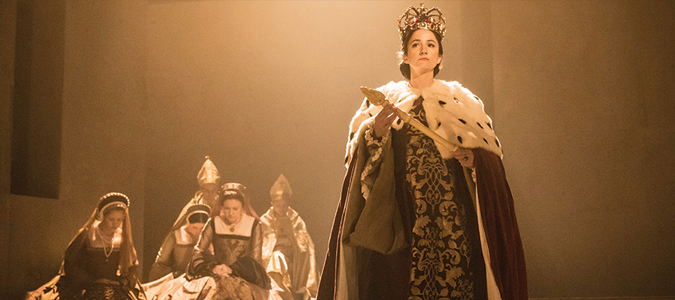

Wolf Hall Parts One & Two
Opening Night: April 9, 2015
Closing: July 5, 2015
Theater: Winter Garden Theatre
The novels, by two-time Booker Prize winner Hilary Mantel, won multiple honors and became world-famous, best-selling sensations. The plays sold out at Stratford-upon-Avon and quickly transferred to London, where they received critical raves, broke box office records and triumphed as the West End’s biggest hit plays. Now the Royal Shakespeare Company’s production of “Wolf Hall Parts One & Two” is on Broadway for a strictly limited engagement! Performed in repertory, this exhilarating story of lust, power and politics will transport audiences to the volatile court of King Henry VIII, where words cut like steel and the shadow of the Tower loomed over all.
BUY TICKETSREAD THE REVIEWS:
April 9, 2015
Despite its title, there are more species than just Canis lupus scurrying and lurking along the margins of “Wolf Hall: Parts One & Two,” the Royal Shakespeare Company’s triumphant, blockbuster adaptation of Hilary Mantel’s Tudor-history novels. It’s a regular illuminated manuscript up there: quivering rabbits standing in for doomed courtiers; clucking hens supplied by gossipy ladies-in-waiting; and warthogs and goats in the form of odious, snobby lords. So many beasts, and only one man their zookeeper: Thomas Cromwell. As cunningly played by Ben Miles (last here as a tongue-tied veterinarian in “The Norman Conquests”), Cromwell is at once cipher, savior and demon over nearly six hours of wrangling between pope and crown, and then within the vipers’ nest that was the court of King Henry VIII (Nathaniel Parker). As reviewers of the novels noted, Hilary Mantel took a figure most historians regard as a cold-blooded architect of the modern totalitarian state—a Machiavel who engineered the downfalls of Sir Thomas More and Anne Boleyn—and imbued him with humane motivations and sympathetic depth. It’s a bit like revealing what an enlightened mensch Senator Joe McCarthy really was.
READ THE REVIEWApril 9, 2015
And now let’s settle in for a really, really good gossip. The subject? The British royal family and its so-called friends. You wouldn’t believe the scandal they’re stirring up these days, with their love affairs and divorces and back-stabbing rivalries. It’s chilling (and thrilling, too — admit it) to listen to these people talk about one another, especially to the all-hearing, frozen-faced spin master at their center. Their conversation gives new resonance to that credo of cattiness, “If you can’t say anything good about someone, come sit next to me.” No, not the Windsors. They’re small-timers when it comes to digging — and flinging — the dirt. For the tastiest dish in town, you need to visit the Tudors of “Wolf Hall,” the riveting two-part theater drama that has taken up residence at the Winter Garden Theater, where it opened on Thursday night. This “Wolf Hall” is not to be confused with the BBC Two television series of the same title, currently being broadcast on PBS, nor with the Man Booker Prize-winning, best-selling novel by Hilary Mantel, on which both the series and the plays are based (along with its sequel “Bring Up the Bodies”). Those are moody, leisurely works, steeped in darkness and, in the case of the novels, swirling introspection.
READ THE REVIEWApril 9, 2015
“The King called me this morning — early.” “What did he want?” “A son.” And with that, we’re off. Off to “Wolf Hall” and “Bring Up the Bodies,” the Royal Shakespeare Company’s celebrated two-part, six-hour costume drama and historical entertainment about King Henry VIII’s infamous habit of discarding wives who can’t produce a male heir. Based on Hilary Mantel’s two prizewinning books, this prestige event of the Broadway season offers straightforward storytelling, finely wrought performances and yards upon yards of magnificent 16th century costumes. An admirable acting Olympiad is led by Ben Miles’ smooth and shrewd portrayal of Thomas Cromwell, the blacksmith’s son who rose to consigliere of the Tudor court. For all the marathon’s heft, however, this is not a perception-altering import comparable to the Globe Theatre’s pair of all-male Shakespeare plays, starring Mark Rylance, in 2013, nor the RSC’s own eight-hour “Nicholas Nickleby” from the ’80s. The plays, directed handsomely but unsurprisingly by Jeremy Herrin, begin with the actors formally arranging themselves and sweeping through a Renaissance dance on a bare stage with granite panels. (The simple sets and meticulously elaborate costumes are by Christopher Oram.)
READ THE REVIEWApril 9, 2015
What are the odds that two works of literary historical fiction, totaling north of 1,000 pages and observing the Tudor court from the perspective of Thomas Cromwell, a shadow figure traditionally regarded in a more sinister light, would become a popular phenomenon? Hilary Mantel’s Booker Prize-winning ‘Wolf Hall’ novels, in addition to selling some three million copies worldwide, have spawned a six-part BBC/PBS miniseries airing in the U.S. concurrently with the Broadway premiere of dramatist Mike Poulton’s stage adaptation for the Royal Shakespeare Company, a brawny two-part epic running 5½ hours. Already a hit in London, where it transferred to the West End after bowing to much acclaim at the RSC’s home base in Stratford, the production is a mighty undertaking. It’s directed by Jeremy Herrin with propulsive energy; designed with commanding stagecraft by Christopher Oram and a superb team on lighting, music and sound; and performed with authority and an abundance of sly humor by a first-rate troupe of 23.
READ THE REVIEWApril 9, 2015
Part deep-dive into Tudor-era historical fiction and part endurance contest, “Wolf Hall” has settled into the vast Winter Garden Theatre, where its two sections are performed in repertory by nearly two-dozen finely tuned members of the Royal Shakespeare Company. The complete stage interpretation of Hilary Mantel’s Man Booker Prize-winning novels—the second volume, “Bring Up the Bodies,” has here been christened “Wolf Hall, Part 2”—can be seen in one six-hour swoop, with a dinner break, or on different days. Even if you walk in with ample historical context about Henry VIII’s volatile court, the story demands intense focus to keep pace. “Wolf Hall” revisits historical figures with whom we’re all at least a bit familiar: Thomas Cromwell, Henry VIII and Anne Boleyn. The title is the location of the Seymour family seat; we’ll presumably hear more from the Seymours when Mantel publishes the eagerly-awaited third volume in her series, some day.
READ THE REVIEW





















